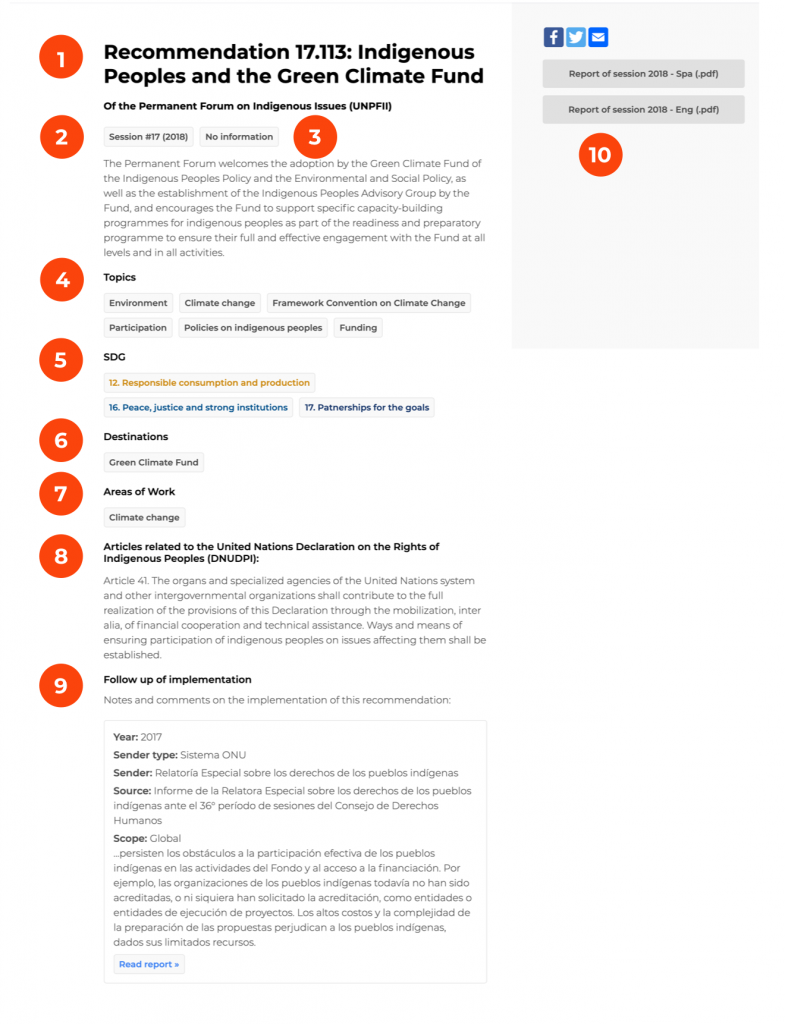![P1130334 [1280x768]](https://yanapaq.info/wp-content/uploads/2019/12/P1130334-1280x768.jpg)
What is Yanapaq.info?
These recommendations are useful to indigenous peoples, women and youth organizations and their partners (human rights defenders, NGOs, etc.) to advocate before States, United Nations bodies, other international mechanisms and spaces, and the private sector.
What is a recommendation of the Permanent Forum?
Following each session of the Permanent Forum – where indigenous peoples from around the world participation – a report is published including recommendations prepared by the expert members. Each one features a goal, has strategic orientation and shows the potential future actions.
Recommendation Anatomy
- Title: includes the Permanent Forum Session and the paragraph number in the final report.
- Session: session number and year when the recommendations were issued. The Forum has annual sessions from 2002 onwards.
- Implementation: based on available information, the secretariat of the Permanent Forum classifies each recommendation as No information, Not initiated, Ongoing, Completed or Retired. We must take into account that the lack of follow-up information is a barrier. Thus, most of the recommendations are classified as “No information”.
- Topics: the Yanapaq.info Team has analyzed each recommendation and tagged them with keywords referring to specific topics relevant to indigenous peoples.
- SDGs: the Yanapaq.info Team has also linked each recommendation to the Sustainable Development Goals or 2030 Agenda, which make up an agenda with 17 global priorities. Achieving the goals would lead to the prosperity of the world population, poverty eradication and protection of the environment.
- Destination: each recommendation is addressed to States (sometimes, one specific country), United Nations bodies, intergovernmental organizations and other relevant groups and actors to its topic. For example, there is a recommendation addressed to the Green Climate Fund.
- Areas of Work: each recommendation is included in one or more areas of work that make up the Permanent Forum mandate. There are six main mandated areas and others that have been included over time.
- Articles of the UNDRIP: the United Nations Declaration on the Rights of Indigenous Peoples, adopted in 2007, is the most important international instrument that states and protects the rights of the world’s indigenous peoples. In its 46 articles, the Declaration establishes the right to equality and non-discrimination, self-determination and self-government, land and territory, and to live in freedom and without violence. The Yanapaq.info Team has linked each recommendation with one or more articles of the Declaration.
- Annotations: they provide follow-up information on the implementation of each recommendation at the local, national, continental and global level. The Yanapaq.info Team has carried out the first round of data collection on the Permanent Forum and other United Nations bodies. Later you will find out how to contribute to Yanapaq.info, sharing information from your organization through the annotation section.
- Report of the Session: you can also download the final report of the referred session in Spanish or English.
Remember that the recommendations of the Permanent Forum are based on the United Nations Declaration on the Rights of Indigenous Peoples, adopted in 2007, is the most important international instrument that states and protects the rights of the world’s indigenous peoples. In its 46 articles, the Declaration establishes the right to equality and non-discrimination, self-determination and self-government, land and territory, and to live in freedom and without violence.
Do you want to contribute to Yanapaq.info?
Yanapaq.info aspires to become a collaborative tool for information exchange within the international indigenous movement, in dialogue with allied civil society organizations; United Nations bodies; and government institutions.
You can contribute to Yanapaq.info sending a brief follow-up on the implementation of recommendations. That way, other indigenous peoples can find out about the progress and setbacks on their implementation. They can learn more through cases at the global, regional or national level shared by different sources.
Also, Yanapaq.info has a news section which will feature information produced by indigenous peoples on the progress and challenges regarding the exercise of their rights. This section will pay special attention to information related to indigenous women, youth and children.
Send follow-up information on any recommendation
Yanpaq.info is an innitiative born in CHIRAPAQ Center for Indigenous Cultures of Peru, fostered by Tarcila Rivera Zea as expert member of the Permanent Forum.


